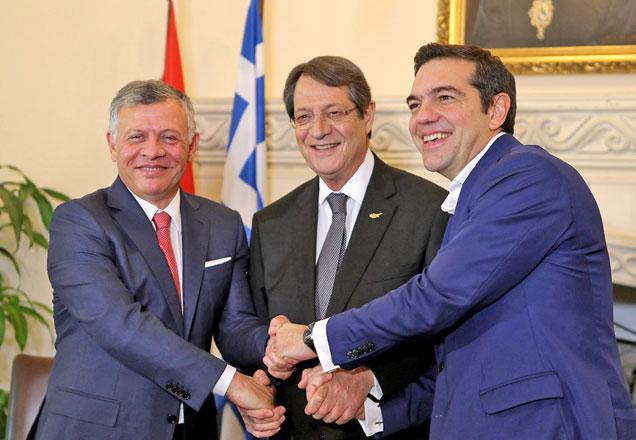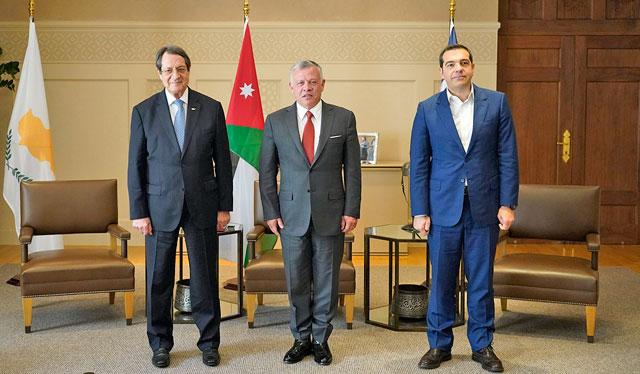You are here
Jordan, Cyprus, Greece launch strategic partnership at trilateral summit
By JT - Jan 16,2018 - Last updated at Jan 16,2018

His Majesty King Abdullah poses for a group photo with Cypriot President Nicos Anastasiades (centre) and Greek Prime Minister Alexis Tsipras in Nicosia on Tuesday (Photo courtesy of Royal Court )
AMMAN — His Majesty King Abdullah on Tuesday participated in a Nicosia-hosted trilateral summit with Cypriot President Nicos Anastasiades and Greek Prime Minister Alexis Tsipras, which focused on cooperation ties between Jordan and each of Cyprus and Greece, as well as regional developments.
The three countries issued at the end of the meeting a joint communiqué that outlined their approach to the tri-party communication and positions on regional crises, vowing to deepen and enrich the partnership to involve the public and private sectors in each of the partner nations (See full text of declaration).
It was announced in the communiqué that Jordan will host the next trilateral summit, without specifying the date for the meeting.
King Abdullah, Anastasiades and Tsipras also attended the signing of a trilateral cooperation agreement on protecting antiquities and intellectual property, and a memorandum of understanding in the renewable energy sector, according to a Royal Court statement.
Discussions in the summit highlighted the importance of building on friendly relations among the three countries, in a way that leads to a fruitful partnership that would further expand cooperation at various levels and contribute to efforts seeking peace, security and stability in the region and the entire world.
The summit, which continued over a working lunch, also tackled the Palestinian issue and Jerusalem, as well as regional crises and the need to work out peaceful solutions to them, and international efforts in the war against terrorism within a holistic approach.
The first session of the trilateral discussions mainly addressed cooperation aspects in enhancing commercial exchange and investment, energy and energy efficiency, tourism, agriculture, aviation and maritime shipping — especially that Aqaba can serve as a gateway to access African markets — health and antiquities protection.
Meanwhile the second session focused on Jordan’s relations with the EU through the Union for the Mediterranean, in addition to developments associated with the Middle East peace process, conditions in Syria and Iraq, and refugee and migration crises.
In joint remarks to the press made by King Abdullah, Anastasiades and Tsipras, His Majesty highlighted the importance of the summit in developing relations among the three countries in a way that serves their peoples and the region.
“Let me start by saying, again, that it is a pleasure to be back here in Cyprus, and to thank you, my friend, for the warm welcome you’ve extended to me on my second visit to your lovely country,” the King said.
His Majesty added that: “Today marked the launch of what we hope will develop into a fruitful trilateral partnership that benefits all our peoples, and our wider region.”
“We in Jordan are committed to cooperating in such vital fields as energy, water, agriculture, and tourism as were mentioned. And moreover, the agreements we are signing today will undoubtedly help us advance our ties even further,” His Majesty added.
The King added that creating partnerships between the private sectors of the three countries in these promising fields will provide jobs and opportunities for our peoples, and benefit our region by ensuring peaceful prosperity and synergy.
“It is no secret that we live in a very tough neighbourhood, rife with challenges, but also with opportunities; and together, our chances of capitalising on these opportunities and taking on these challenges increase tenfold,” King Abdullah stressed.
During our very extensive and productive discussions today, we agreed to continue our cooperation within the framework of Jordan’s partnership with the European Union, the Monarch said.
He expressed the Kingdom’s aspirations to working with Cyprus and Greece to benefit from the EU’s simplified rules of origin to enhance “our national industries and increase our exports to Europe”.
In addition, the discussions today covered key global and regional issues, His Majesty said, adding that Jordan continues to support the efforts of Cyprus to reach a comprehensive, just, lasting and viable solution to the Cyprus problem in accordance with UN Security Council resolutions and international law.
As for the Middle East, the King stressed that “there can be no peace; nor can there be stability without a just and permanent solution to the Palestinian-Israeli conflict, and Jerusalem is key to resolving it”.
The issue of Jerusalem must be settled within a comprehensive peace agreement based on the two-state solution that guarantees the establishment of an independent Palestinian state, with East Jerusalem as its capital, living side by side with Israel, His Majesty said.
He added: “No unilateral decision on Jerusalem will change the legal and historical facts or undermine the rights of Muslims and Christians to the holy city.”
The Hashemite Custodianship of Jerusalem’s Islamic and Christian holy sites is a religious and historical responsibility that Jordan remains fully committed to, King Abdullah emphasised.
“But the whole world has a vested interest in the responsibility towards Jerusalem and the Palestinian issue; we all have a stake in reaching peace, and avoiding the consequences of further escalation. And here, the European Union can contribute to efforts to bring Palestinians and Israelis to the negotiating table.”
He added that Jordan, Cyprus, and Greece are also committed to fighting the global terrorist and extremist threat within a holistic approach.
“To that end, Jordan, through the Aqaba Meetings, has been working to bring allies and stakeholders together to discuss how coordination can be improved to close off all avenues to terrorists and extremists around the world. And I, again, want to thank the role of Cyprus in this process,” the Monarch said.
The victories achieved in Iraq against terrorism and the gains in Syria mark substantial progress in this fight; however, terrorist groups cannot be allowed to regroup and establish footholds elsewhere, he stressed.
“For Syria, we affirm the importance of building on the Astana talks to reach a political solution through the Geneva process that maintains the country’s territorial integrity and fulfils the aspirations of the Syrian people.”
In this regard, the King added: “And in the meantime, the plight of Syrian refugees remains an international concern, and host countries like Jordan need the world’s support. We are shouldering an immense refugee burden and cannot be left alone as we undertake this humanitarian responsibility on behalf of the world.”
“And, again, sir, I would like to thank your voice in recognising Jordan’s challenges to the European Union, and to be standing side by side as we go through these challenges”, His Majesty said, addressing the Cypriot leader.
Anastasiades said that the meeting highlighted the good relations among the three countries and laid the foundation for a strategic regional cooperation in several fields, which will contribute to achieving positive outcomes at the political, economic and social levels.
He said that the first trilateral summit was held under difficult circumstances in the Middle East, and the top challenges that has to be addressed is terrorism that makes it crucial to have a close cooperation among the three countries.
In this regard, he commended the “Aqaba Process” initiative, which he described as “undoubtedly contributes to strengthening the capabilities in the war against terrorism in the region.
On the peace process, he reiterated his country’s support to the international community’s efforts aimed at reviving the peace process and vital roles of regional players, including Jordan.
For his part, Tsipras said that the summit stressed the need to finding a solution to the Syrian crisis, in a way that improves conditions on the ground and guarantees a democratic future.
He said that Greece and Cyprus face grave repercussions for being neighbouring countries to Syria from the southern borders of the EU, and being a barrier in the face of terrorism.
On the Palestinian issue, the Greek premier highlighted the importance of resuming just peace negotiations based on the two-state solution, which, according to him, his country supports.
Meanwhile, His Majesty and Anastasiades held talks in the presidential palace on bilateral relations and the latest regional developments.
They also attended the signing of several agreements and memoranda of understanding in the fields of technical and economic cooperation, mutual accreditation of higher education certificates and increasing student exchange, maritime transportation, public health and medical sciences and agriculture.
King Abdullah also had a meeting with Tsipras, where they highlighted the “deep-rooted” ties between Jordan and Greece, and the importance of further developing them.
Jordan and Greece signed a cooperation agreement on the maritime transportation.
Related Articles
AMMAN — His Majesty King Abdullah, Cypriot President Nicos Anastasiades and Greek Prime Minister Alexis Tsipras agreed during their trilater
AMMAN — His Majesty King Abdullah on Tuesday will participate in the Tripartite Summit hosted by Cypriot President Nicos Anastasiades and Gr
AMMAN — Cyprus Ambassador to Jordan Michalis Ioannou praised the countries' political cooperation and recognised Jordan's role as “a linchpi

















